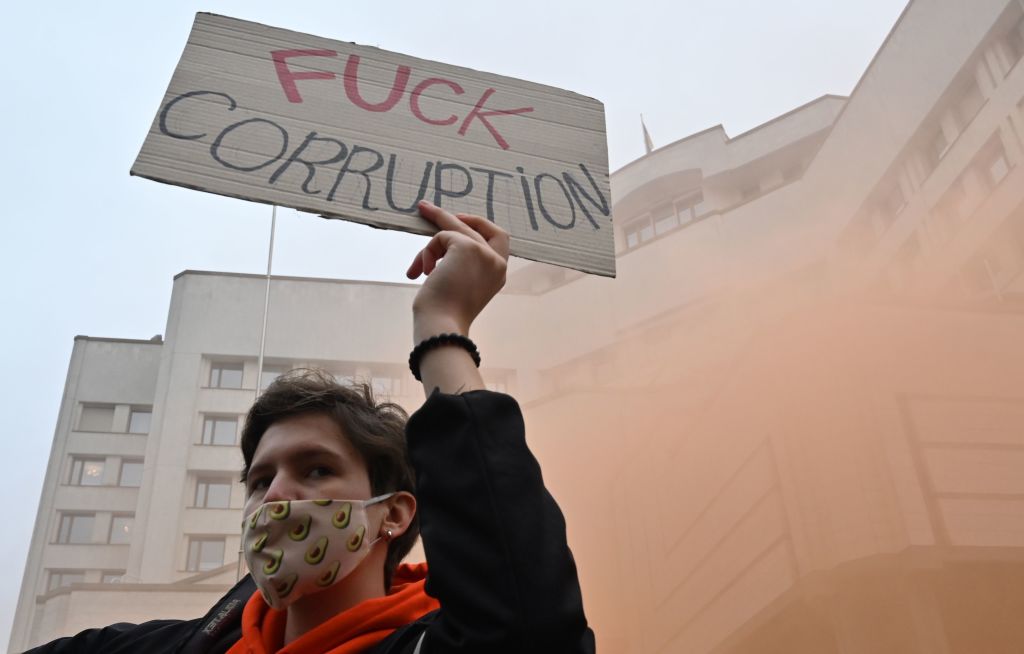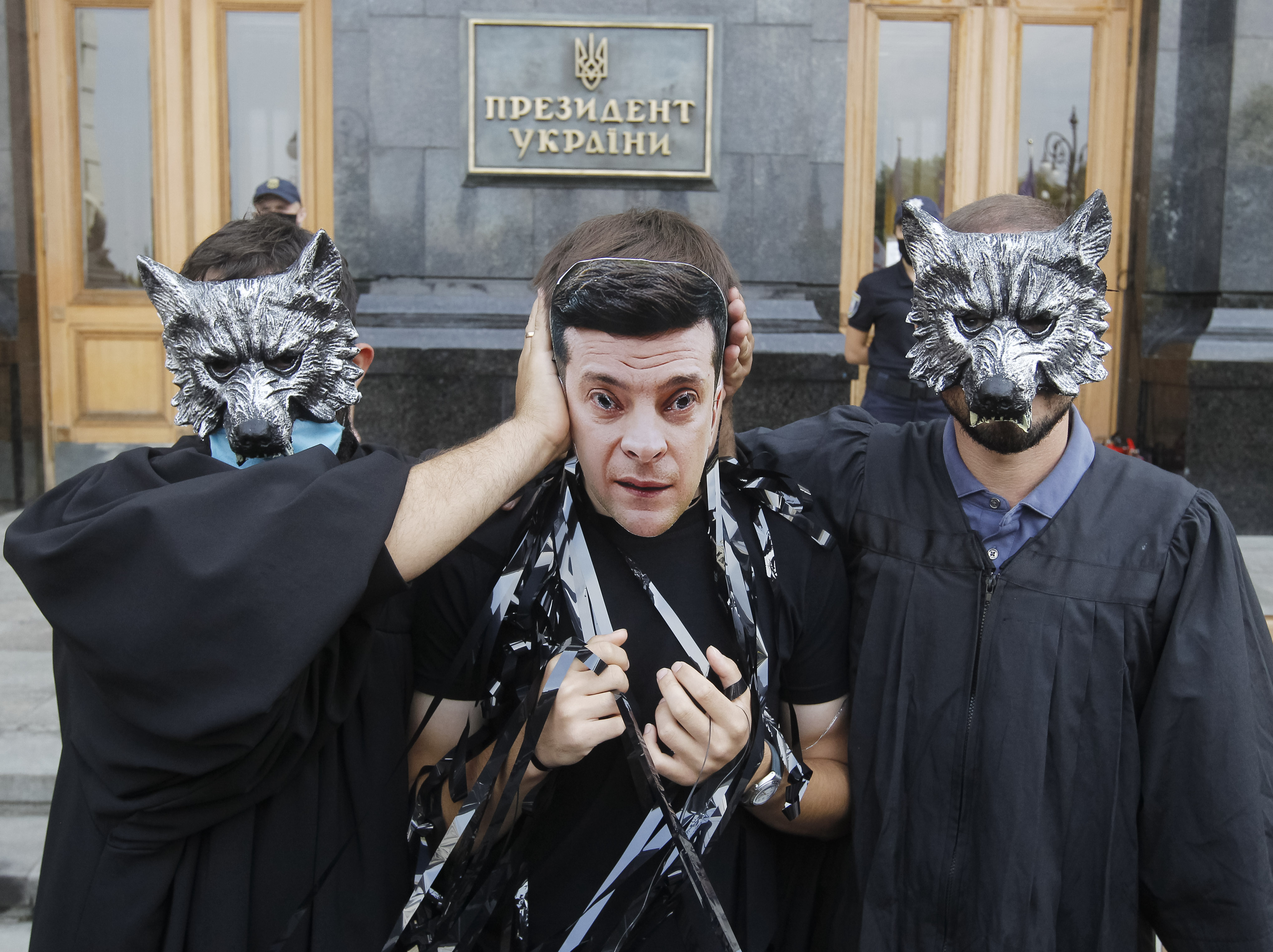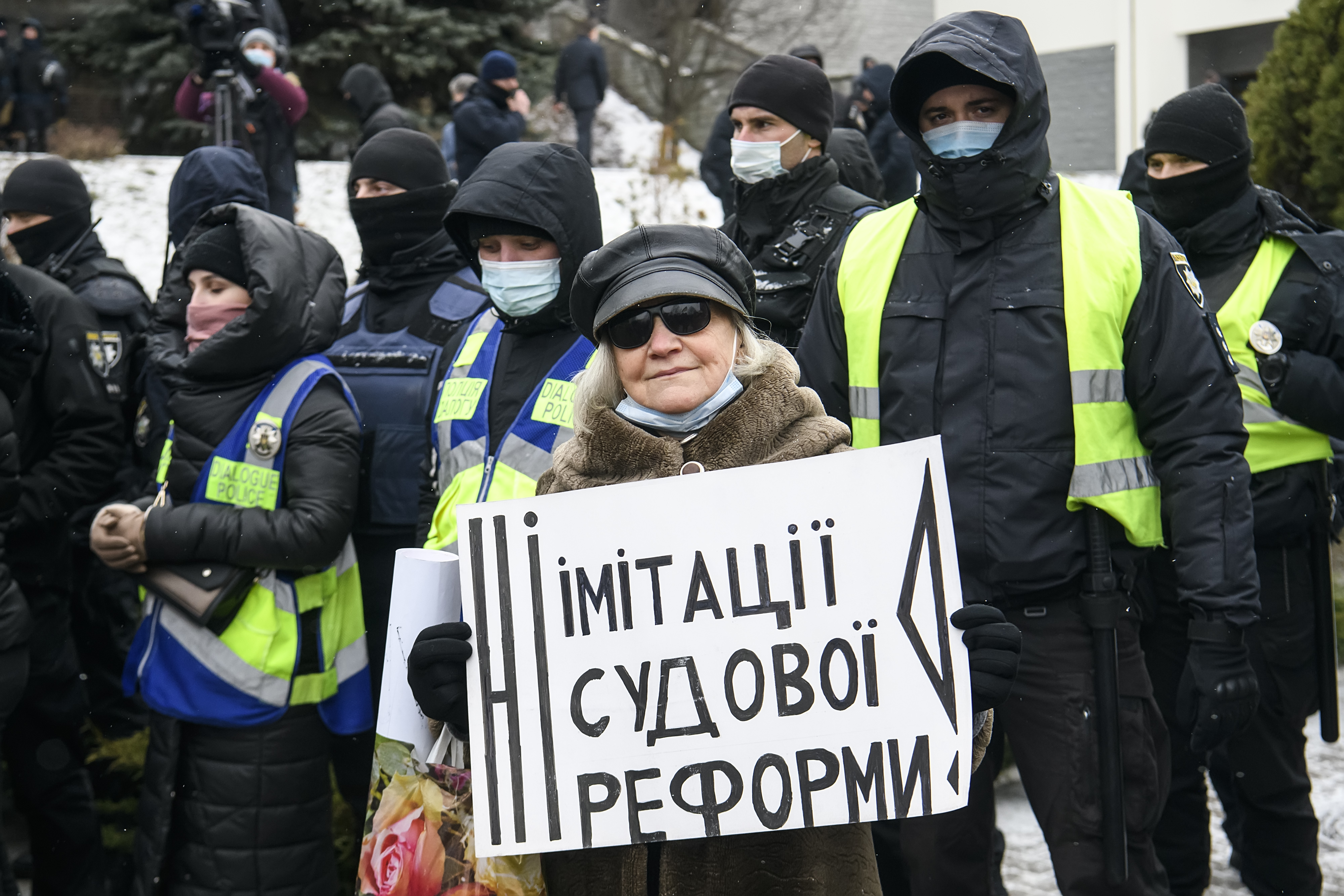Ukraine’s judicial reform has mixed reviews as it nears key point

As Ukraine is fighting Russia on the front lines, a much quieter battle is happening in the government offices in Kyiv: the fight to bring the long-suffering judicial reform to life.
Compared to the war, almost no one is watching this contest.
And yet it’s this battle that will define, in some ways, what post-war Ukraine looks like.
Nine years after the first efforts were made to transform one of Ukraine’s least trusted institutions, the court system, the reform still faces an uncertain future.
The need for it is more evident than ever. Just recently, the head of the Supreme Court was detained on charges of accepting a $3 million bribe.
Trusted and independent candidates have been excluded from competitions for key judicial posts, while tainted ones have been green-lighted.
“(Incumbent) judges don’t like those who go against the system,” said Halia Chyzhyk, a judicial expert that has been monitoring Ukraine’s attempts to reform the courts.
The latest judicial reform was launched by President Volodymyr Zelensky in 2019. Currently, the reform is being completed as new members of a top judicial body, the High Qualification Commission, are being chosen after years of delay.
It is still unclear if the reform will lead to any substantial change in the judiciary.
Optimists see it as a step forward despite all the drawbacks, while critics argue it is just a facade for the entrenchment of the corrupt judiciary.
State of the reform
Under the reform, international experts and Ukrainian officials are supposed to hire new members of two judicial bodies – the High Council of Justice and the High Qualification Commission. The new members are supposed to be independent, honest and professional people, according to the current concept of the reform, which has been in the works since 2019.
The High Council of Justice, the judiciary’s main governing body, makes final decisions on hiring, firing and punishing judges.
The High Qualification Commission, which is subordinate to the High Council of Justice, vets and nominates candidates for judicial jobs.
In 2022, a body comprising three Ukrainian judges and three international experts finally nominated new members of the High Council of Justice, and the council resumed work in January 2023, after having been suspended for a year.
The work to staff the second key agency of the reform is underway.
In March, a different selection panel comprising three Ukrainian judges and three international experts nominated 32 candidates for the High Qualification Commission. The High Council of Justice finished interviewing the candidates on May 12 and is expected to appoint up to 16 members of the High Qualification Commission on June 1.
Controversy over rejected candidates
The selection panel has stated that its assessment would be based on the principle of “positive selection” – the selection of the best of the best, as opposed to just weeding out the worst.
Chyzhyk told the Kyiv Independent that she and other representatives of civil society had promoted this principle but the selection panel had failed to implement it.
“They were supposed to choose the best but there are doubts on whether (those they chose) can be considered the best,” she said.
Several people with a positive reputation according to civil society were thrown out by the selection panel at the initial stage, in December 2022, and were not allowed to proceed to the interview stage.
At the initial stage, 64 people were chosen out of 301 candidates.
Those rejected at the beginning include Vitaly Tytych, a former head of civic watchdog Public Integrity Council, Andriy Boyko, a former reformist member of the High Council of Justice, Sergii Gorbatuk, an outspoken former investigator at the prosecutor's office, and Lyubomyr Vynar, a whistleblower judge.
These candidates were on the list of candidates recommended by civil society to the selection panel, and yet they were rejected nonetheless.
The decision to reject Tytych raised eyebrows among Ukraine’s civil society.
He has been involved in judicial reform for many years and has often criticized the authorities for failures and setbacks in the reform.
In 2016-2018, Tytych was the head of the Public Integrity Council, a civil society watchdog that was created under the law to ensure integrity standards in the judiciary.
Due to its uncompromising stance on judicial reform, the Public Integrity Council criticized the top judicial bodies and accused them of protecting corrupt judges.
Tytych believes that the latest attempt at judicial reform has failed.
The whole system of contests for top judicial jobs has been sabotaged by corrupt interests because the authorities lack political will for reform, he told the Kyiv Independent. The selection panel for the High Qualification Commission denied the accusations of sabotage.
Another rejected candidate, Gorbatuk, was the top investigator in charge of cases involving the 2014 EuroMaidan Revolution until 2019. He has been praised by civil society for his independent stance and integrity.
In 2014-2019, Gorbatuk accused his own boss, then Prosecutor General Yury Lutsenko, as well as then President Petro Poroshenko and then Interior Minister Arsen Avakov, of sabotaging EuroMaidan investigations. Gorbatuk, who also tried to initiate a criminal case against Lutsenko over the alleged sabotage, was fired in 2019.
Reasons for rejection
The selection panel, which denied the accusations of wrongdoing, has been criticized for its failure to explain its rejection of these candidates.
“The selection commission refused to explain the motives for its decisions,” Chyzhyk said. “The (64 candidates) were chosen arbitrarily without any explanations.”
Mykhailo Zhernakov, head of judicial watchdog Dejure, agreed. He told the Kyiv Independent that there are doubts about the objectivity of the commission’s choice of candidates.
The panel argued that the first stage of the selection process was based on candidates’ cover letters.
“Nobody understands the criteria,” Gorbatuk, one of the rejected candidates, told the Kyiv Independent. “How are the cover letters (of those chosen) different from the cover letters of others?”
The selection panel’s decisions prompted speculation that some of the candidates, namely Tytych and Gorbatuk, were rejected because of their independence and integrity.
“(The judicial establishment rejected them) because they thought they would act in an independent and brave way and would not accept compromises," Chyzhyk said.
Zhernakov agreed, saying that “it’s a pity that they didn’t approve some of the good candidates.”
“It’s the influence of the judicial mafia. Some people hurt them more than others,” he said in a reference to reformers who went against judicial corruption and were thrown out of the contest as a result.
Gorbatuk believes that the judicial establishment rejected these candidates because “(the authorities) can’t afford having someone they don’t control there.”
In its response to the Kyiv Independent, the selection panel argued that it had chosen the best candidates who meet integrity and professionalism standards. The panel added that external influence on the panel’s decisions is impossible.
Interview stage
During the next stage of the selection of the members of the High Qualification Commission, the selection panel held interviews with candidates, choosing 32 out of the 64 of them in March.
Chyzhyk argued that the interview stage was more objective than the initial stage since the interviews were broadcasted, and everyone could see why certain candidates were rejected.
Specifically, 16 judges with a controversial reputation were vetoed.
“This confirms that the last stage was objective,” Chyzhyk said.
Some on the final list of 32 candidates have a positive reputation. These include legal scholar Mykola Khavronyuk; Yaroslav Dukh, a former employee of the National Anti-Corruption Bureau of Ukraine and the National Agency for Corruption Prevention; outspoken judge Serhiy Chumak; Andriy Kozlov, a former reformist member of the High Qualification Commission, and Taras Shepel, a former member of the Public Integrity Council.
However, several other people praised by civil society were vetoed during the interview stage. One of them is Maryna Solovyova, a former member of the commission that identified judges who illegally cracked down on protesters during the 2014 EuroMaidan Revolution.
Meanwhile, Roman Kuybida, a former member of the Public Integrity Council, and Roman Brehei, a judge known for his independent stance and support for judicial reform, withdrew their candidacies.
Civic watchdogs have also identified at least four candidates on the final list who they say do not meet ethics and integrity standards.
One of the candidates, Yury Bodnaruk, is an aide to a judge who has worked at a legal consulting firm allegedly linked to criminal bosses and corrupt schemes, according to an investigation by online newspaper Ukrainska Pravda.
Lyudmila Volkova, a former judge, has spoken out against judicial reform and issued decisions against peaceful protesters.
Volkova also protected Volodymyr Babenko, a controversial court chairman, when she considered complaints against him as a member of the Council of Judges in 2015-2018, according to Chyzhyk and Zhernakov. Babenko, who was accused of pressuring judge Serhiy Bondarenko, was not punished as a result.
Kostyantyn Krasovsky, who headed the legal department at ex-President Petro Poroshenko’s administration, is accused by civic activists of sabotaging judicial reform under Poroshenko.
Moreover, the declared assets of Krasovsky, Volkova and Bodnaruk do not match their income, Chyzhyk said.
Another candidate, Dmytro Lukyanets, is a member of the management board of an association founded by controversial pro-Kremlin politicians Serhiy Kivalov and Andriy Portnov.
The candidates did not respond to requests for comment.
Commenting on civic watchdogs’ accusations against these candidates, the selection panel said that it condemns and does not accept any influence on the panel, including influence by civic watchdogs. The panel argued that the candidates meet integrity and professionalism standards.
After the interviews with the selection panel, the contest entered its final stage. During this stage, all candidates had a second set of interviews with the High Council of Justice, which is expected to choose 16 out of the 32 candidates on June 1.
Chyzhyk and Zhernakov said that during the interviews members of the High Council of Justice had a more loyal attitude towards several candidates who were blacklisted by civic watchdogs as not meeting integrity standards.
On the other hand, they were biased against reform-minded Kozlov, with one member saying that he would question him in the same way that Kozlov himself vetted judges when he was a member of the High Qualification Commission.
“Despite everything, the final list is not bad,” Zhernakov said. “But out of them, (the High Council of Justice) may choose 16 good ones or 16 candidates who are neither fish nor fowl.”
Golnyk case
There was a similar controversy in 2022, when a different selection panel vetoed whistleblower judge Larysa Golnyk as a candidate for the High Council of Justice and approved several controversial and tainted candidates for council jobs. The panel also banned broadcasts of its interviews with candidates, citing alleged security risks due to the ongoing Russian invasion.
The panel did not respond to requests for comment.
Ukraine’s leading anti-corruption watchdogs issued a statement, saying that the panel had undermined trust in the process by taking these steps, and that the decisions may lead to “catastrophic results” for judicial reform.
Golnyk, who was vetoed by the selection panel, is Ukraine’s most famous whistleblower judge and has become a symbol of integrity for civil society watchdogs.
In 2015, Golnyk published video footage featuring Poltava Mayor Oleksandr Mamai pressuring her to close a corruption case against him. She also published footage of his deputy, Dmytro Trikhna, unsuccessfully trying to bribe her in exchange for closing the case. They deny the accusations of wrongdoing.
Golnyk has also accused Oleksandr Strukov, an ex-chairman of her court, of pressuring and physically assaulting her in connection with the Mamai case, which Strukov denies.
The selection panel vetoed Golnyk because she allegedly violated judicial ethics by calling her colleagues who supported Strukov “loyal sheep.”
Chyzhyk argued that Golnyk’s statement about her colleagues should be considered only in the context of her whistleblowing activities and Strukov’s pressure. Therefore it cannot be considered a violation, she added.
“This cannot be considered out of context,” Chyzhyk said.
Golnyk believes the judicial establishment had taken revenge for her going against the system.
She addressed the selection panel, asking it to reverse the decision, and then filed a lawsuit with the Supreme Court.
The court threw out the lawsuit, claiming that she did not have the right to appeal the panel’s decisions. Golnyk believes she has been deprived of the right of appeal.
“It’s impossible to appeal these decisions,” she told the Kyiv Independent. “I have been rejected by the judicial community."
Foreign experts’ role
The decisions on candidates for the High Council of Justice and the High Qualification Commission were made jointly by Ukrainian judges and international experts on the selection panel. This led to a controversy over the role of the foreign experts.
They were invited to take part in the reform in order to ensure the independence and integrity of the selection process.
The involvement of foreign experts was not a mistake since they vetoed many candidates who did not meet ethics and integrity standards, Chyzhyk argued.
However, the Ukrainian members used the fact that the international experts didn’t know the Ukrainian context and manipulated facts in order to reject good candidates and promote bad ones, Chyzhyk said.
Gorbatuk also argued that “the foreign experts were deceived.”
Chyzhyk believes that the foreign experts would have been more effective if representatives of Ukrainian civil society worked jointly with them to vet candidates.
“This would make manipulations with the Ukrainian context impossible,” she said.













